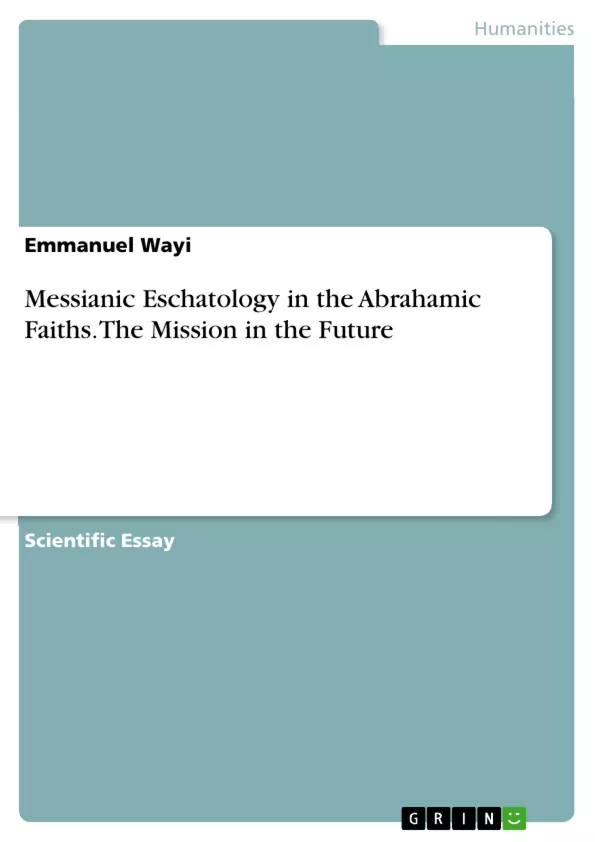This paper tries to find common ground between Christianity, Islam and Judaism on the issue of what they believe and hope for.
All these faiths seem to have the same belief in a Messiah who will come for a particular mission later on in the future for the benefit of all humans. They may refer to these messianic figures differently but careful studies have shown that the expected duties are the same in the three Abrahamic faiths.
Did you know that the Christians are expecting a Messiah?
Did you know that the Muslims are expecting a Mahdi?
Did you know that the Jews are expecting a Mashiach?
This paper analyses their coming and purposes and shows how they are supposed to meet and agree somewhere while we fight and disagree here.
If we can understand and see the commonalities, then there is absolutely no need to promote our differences at the expense of being united. Find out for yourself.
Inhaltsverzeichnis (Table of Contents)
- INTRODUCTION
- DEFINITION OF TERMS
- Messiah
- Eschatology
- Mission
- MESSIAH IN JUDAISM
- MESSIAH IN ISLAM
- MESSIAH IN CHRISTIANITY
- SHARED MESSIANIC EXPECTATIONS BETWEEN THE ABRAHAMIC FAITHS
- CONCLUSION
Zielsetzung und Themenschwerpunkte (Objectives and Key Themes)
This work explores the concept of Messianic eschatologies in the three Abrahamic faiths: Judaism, Christianity, and Islam. It delves into the common ground shared by these religions regarding the belief in the coming of a Messiah, as well as the distinct perspectives each faith holds on the Messiah's role and mission.
- The concept of the Messiah across different Abrahamic faiths
- The role and mission of the Messiah in each faith
- Shared Messianic expectations between the Abrahamic faiths
- The importance of eschatology in understanding Messianic figures
- The historical and cultural context surrounding Messianic beliefs
Zusammenfassung der Kapitel (Chapter Summaries)
- INTRODUCTION: This chapter introduces the concept of "Abrahamic faiths" and highlights the common belief in the coming of a Messiah within these religions. It emphasizes the importance of understanding Messianic eschatologies in relation to the hopes and anticipations of each faith.
- DEFINITION OF TERMS: This chapter defines key terms such as "Messiah", "Eschatology", and "Mission", providing a foundational understanding of the concepts central to the work.
- MESSIAH IN JUDAISM: This chapter examines the Jewish perspective on the Messiah, including the concept of the "Mâshîach" and the role of the Messiah in fulfilling prophecies and restoring the Jewish nation to its glory.
Schlüsselwörter (Keywords)
The primary focus of this work is on Messianic eschatologies within the Abrahamic faiths. Key terms and concepts include Messiah, eschatology, mission, Judaism, Christianity, Islam, shared expectations, and the historical and cultural context of Messianic beliefs.
Frequently Asked Questions
What are the "Abrahamic faiths"?
They refer to Judaism, Christianity, and Islam, which all trace their spiritual lineage back to the patriarch Abraham.
Who is the Messiah in Judaism?
In Judaism, the "Mâshîach" is an expected future leader who will restore the kingdom of Israel and bring about a time of universal peace.
What is the Islamic view of the Mahdi?
Muslims expect the Mahdi to appear in the future to rid the world of evil and injustice before the Day of Judgment.
What common ground exists regarding Messianic expectations?
All three faiths share a belief in a future figure sent by God for a mission of justice, peace, and the benefit of humanity.
What is "eschatology"?
Eschatology is the part of theology concerned with death, judgment, and the final destiny of the soul and of humankind.
- Quote paper
- Rev Emmanuel Wayi (Author), 2016, Messianic Eschatology in the Abrahamic Faiths. The Mission in the Future, Munich, GRIN Verlag, https://www.grin.com/document/340407



